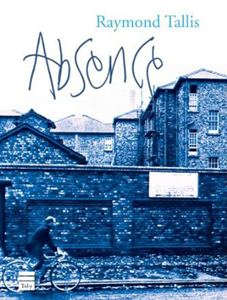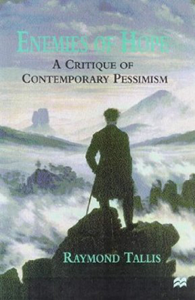




Over the last 30 years, Raymond Tallis has published extensively outside of medicine. His prose has appeared in Granta, Encounter, PN Review, Philosophy Now, News from the Republic of Letters, Prospect, The Times, The Times Literary Supplement, New Atlantis and elsewhere.
His novel Absence: a Metaphysical Comedy (Toby Press) came out in 1999, and was re-issued in paperback in 2006. He has published several volumes of verse, the most recent being Fathers and Sons (Iron Press, 1993). A comprehensive list of his non-medical writings can be found in the Bibliography (non-medical) section of this website.
(Iron Press, 1993). A comprehensive list of his non-medical writings can be found in the Bibliography (non-medical) section of this website.
In 1988, Professor Tallis published two books critical of the post-structuralist 'thought' which had assumed a dominant position in humanities departments: Not Saussure: A Critique of Post-Saussurean Literary Theory (Macmillan: 2nd edition, 1995), which exposed its shaky philosophical foundations; and In Defence of Realism (Edward Arnold; 2nd edition, University of Nebraska Press, 1998) which defended realistic fiction and, more widely, referential discourse, from ill-conceived attacks by exponents of postmodern 'Theory'. Theorrhoea and After (Macmillan, 1998) completed his critique of Theory and explores literature and art from a post-Theory standpoint.
His further explorations of the nature of consciousness and of other philosophical topics are contained in On the Edge of Certainty: Philosophical Explorations , which was published by Macmillan in 1999. In 1995, Tallis published Newton's Sleep: Two Cultures and Two Kingdoms
, which was published by Macmillan in 1999. In 1995, Tallis published Newton's Sleep: Two Cultures and Two Kingdoms , (Macmillan) which defends science and technology against their detractors and art against its defenders, and relates both to the ends and aims of human life. His most wide-ranging critique of contemporary fashions in the humanities, which brings together many strands of his thought, is The Enemies of Hope: A Critique of Contemporary Pessimism, Irrationalism, Anti-humanism and the Counter-enlightenment
, (Macmillan) which defends science and technology against their detractors and art against its defenders, and relates both to the ends and aims of human life. His most wide-ranging critique of contemporary fashions in the humanities, which brings together many strands of his thought, is The Enemies of Hope: A Critique of Contemporary Pessimism, Irrationalism, Anti-humanism and the Counter-enlightenment (Macmillan, 1997; paperback edition, with a new preface, 1999). This a comprehensive attack on those humanist intellectuals who would undermine the notion of the conscious human agent and who mock the hope of progress brought about by such agents. It focuses in particular on two trends in twentieth century thought: the treatment of civilisation as if it were intrinsically pathological; and the marginalisation of consciousness. Enemies of Hope rejects the anti-humanism, irrationalism and pessimism of much contemporary thought and makes the case for a 'chastened' version of the enlightenment project. An anthology of his non-medical writing — The Raymond Tallis Reader
(Macmillan, 1997; paperback edition, with a new preface, 1999). This a comprehensive attack on those humanist intellectuals who would undermine the notion of the conscious human agent and who mock the hope of progress brought about by such agents. It focuses in particular on two trends in twentieth century thought: the treatment of civilisation as if it were intrinsically pathological; and the marginalisation of consciousness. Enemies of Hope rejects the anti-humanism, irrationalism and pessimism of much contemporary thought and makes the case for a 'chastened' version of the enlightenment project. An anthology of his non-medical writing — The Raymond Tallis Reader , edited by Michael Grant — was published by Macmillan (Palgrave) in September 2000.
, edited by Michael Grant — was published by Macmillan (Palgrave) in September 2000.
This in a sense drew a line under a decade of publications much of whose content was "reactive", being prompted by hostility to some of the most prominent intellectual trends of the last century. The books written since then have explored what Ray Tallis believes to be more original ideas, though some of them have been foreshadowed or are implicit in earlier critiques of post-Saussurean thought and of neural theories of consciousness. A Conversation with Martin Heidegger (Palgrave), was published in December 2001. It is a detailed examination of the ontology proposed in Being and Time in the form of an imaginary conversation with its author. Its main argument is that the persuasiveness of Heidegger's ontology (and of his argument that the epistemological problems that Descartes placed at the heart of philosophy can be by-passed) relies upon a systematic ambiguity in the status of Da-sein: sometimes it is a category (cf. 'mind') and sometimes it is a collection of individuals (cf. minds). Professor Tallis's major philosophical work of the first decade of the century is a trilogy (with the overall title of Handkind) on human consciousness: The Hand; I Am; and The Knowing Animal:
(Palgrave), was published in December 2001. It is a detailed examination of the ontology proposed in Being and Time in the form of an imaginary conversation with its author. Its main argument is that the persuasiveness of Heidegger's ontology (and of his argument that the epistemological problems that Descartes placed at the heart of philosophy can be by-passed) relies upon a systematic ambiguity in the status of Da-sein: sometimes it is a category (cf. 'mind') and sometimes it is a collection of individuals (cf. minds). Professor Tallis's major philosophical work of the first decade of the century is a trilogy (with the overall title of Handkind) on human consciousness: The Hand; I Am; and The Knowing Animal:
-
The Hand: a Philosophical Inquiry into Human Being (Edinburgh University Press, 2003) is a comprehensive examination and celebration of the human hand which, it is argued, lies at the root of most of what sets humans apart from other animals. The hand is the biological key to our progressive liberation (over the last several million years) from biology. The Hand offers an account of how it is that humans, who are in many respects part of nature, are at the same time distant from it, as is reflected in their unique ability to manipulate and conceptualise the natural world.
-
I Am: a Philosophical Inquiry into First Person Being (Edinburgh University Press, 2004). An investigation of the relationship of human beings to their own bodies underpins an account of the nature of personal identity; of the uniquely human first person (and 'am' with its anomalous logic); and of the origin of the freedom of the will that humans alone enjoy.
-
The Knowing Animal: a Philosophical Inquiry into Knowledge and Truth (Edinburgh University Press, 2004). An investigation of the relationship between sensing (common to all animals, including humans) and propositional awareness or knowledge, which only humans possess, aims to throw light on the character of a creature that is uncoupled from nature and thereby enabled to engage with it on entirely different, and more favourable, terms.
Tallis's book reflecting on the origins, the present state, and the destination of medicine — Hippocratic Oaths: Medicine and its Discontents (Atlantic, 2004) which was serialised in The Times — has been widely praised and has provoked extensive debate on the direction British medicine is taking.
His recent books are:
-
-
The Kingdom of Infinite Space: A Fantastical Journey Round Your Head (Atlantic Books, 2008) reflects on, and celebrates, the peculiar nature of human beings as embodied subjects. This has been co-published in USA and is being translated into Spanish, Italian, Dutch and Russian.
-
Hunger (Routledge, 2008) examines the metamorphoses of biological hunger in human beings — from needs rooted in biology to spiritual needs remote from biology
-
Michelangelo's Finger: An Exploration of Everyday Transcendence (Atlantic, 2010) investigates the uniqueness of humanity and the complexity of human nature through an examination of, and reflection upon, the apparently simple gesture of pointing.
(Atlantic, 2010) investigates the uniqueness of humanity and the complexity of human nature through an examination of, and reflection upon, the apparently simple gesture of pointing.
-
Aping Mankind: Neuromania, Darwinitis and the Misrepresentation of Humanity  (Routledge 2011) a comprehensive attack on ‘biologism’ the notion that humans are best understood as animals, their minds are best explored through brain science and their behaviour best explained through evolutionary theory.
(Routledge 2011) a comprehensive attack on ‘biologism’ the notion that humans are best understood as animals, their minds are best explored through brain science and their behaviour best explained through evolutionary theory.
-
In Defence of Wonder and Other Philosophical Reflections  (Routledge 2012) which makes the case for the ‘articular wonder’ that is philosophical inquiry at its best and, in a series of essays, illustrates the philosophical approach to the phenomena of everyday life.
(Routledge 2012) which makes the case for the ‘articular wonder’ that is philosophical inquiry at its best and, in a series of essays, illustrates the philosophical approach to the phenomena of everyday life.
-
Reflections of a Metaphysical Flaneur (Acumen 2013) These essays from one of our most stimulating thinkers showcase Tallis's infectious fascination, indeed intoxication, with the infinite complexity of human lives and the human condition. Written with the author's customary intellectual energy and vigour they provoke, move and challenge us to think differently about who we are and our place in the material world.
-
Epimethean Imaginings (Routledge 2014) These essays, written in the spirit of Goethe’s Epimetheus who "traces the quick deed to the dim realm of form-combining possibilities", display the depth and breadth of Tallis’s fascination with our lives. Whether discussing philosophical "hardy perennials" like time, or a mundane artefact like ink, Tallis challenges us to think differently about who we are and why we are.
-
Summers of Discontent with Julian Spalding (Wilmington Square 2014) Summers of Discontent goes to the heart of the arts. It's an examination of why artists create them in the first place and why we all feel the need for them. Tallis thinks the arts spring from our inability as humans fully to experience our experiences; from our hunger for a more rounded, more complete sense of the world.
His publications have been largely favourably received, although those whose views he has attacked — in particular literary theorists and assorted postmodernists — have passed them over in silence. Four of his books have achieved second editions. In addition to reviews of his individual works, three articles have appeared — in UK, Portugal and Canada — in scholarly journals overviewing, and commending, his work. He was awarded the degree of Doctor of Letters (Honoris causa) at the University of Hull in 1997 for his non-medical writings and received the degree of Doctor of Letters (Honoris causa) at the University of Manchester in May 2002, for "contributions to literary theory and our understanding of human consciousness".
Ray Tallis has given radio talks on a variety of topics, among them: the meaning of words; the function of art; and the political culture of his native city, Liverpool. He debated Nietzsche, nihilism and post-modernism on Melvyn Bragg's In Our Time. His radio play (with David Perry), about the philosopher Wittgenstein, On the Edge of Certainty was broadcast in 1988. He has been on Start the Week, on Nightwaves, and numerous other local and national radio programmes. He has contributed to the World Service Forum programme and has recently been interviewed on Canadian and Australian radio. He makes regular appearances on the festival circuit (Hay, Edinburgh, Cheltenham (literary and science), Dartington etc.), lectures widely, and is a regular contributor to The Battle of Ideas. He was a judge of the newly established £25,000 Wellcome Trust Book Prize. He was invited to give the opening keynote address at the European Society for the Study of English in Helsinki in 2000. In 2004, Raymond Tallis was identified in Prospect magazine as one of the top 100 public intellectuals in the United Kingdom. In 2007 he was nominated in The Independent as one of 50 'Brains of Britain'. He was on Desert Island Discs in April 2007 and the presenter Kirsty Young later declared him to be her favourite castaway. In the Economist's Intelligent Life Magazine (Autumn 2009) Tallis was listed as one of the top living polymaths in the world. In July 2015 he was awarded Hon Doctor of Science (Medicine) St George's University of London.
Honorary Visiting Professor in English Literature University of Liverpool: 2008-2013.
Philosophy Now Award for Contributions in the Fight Against Stupidity 2013.







